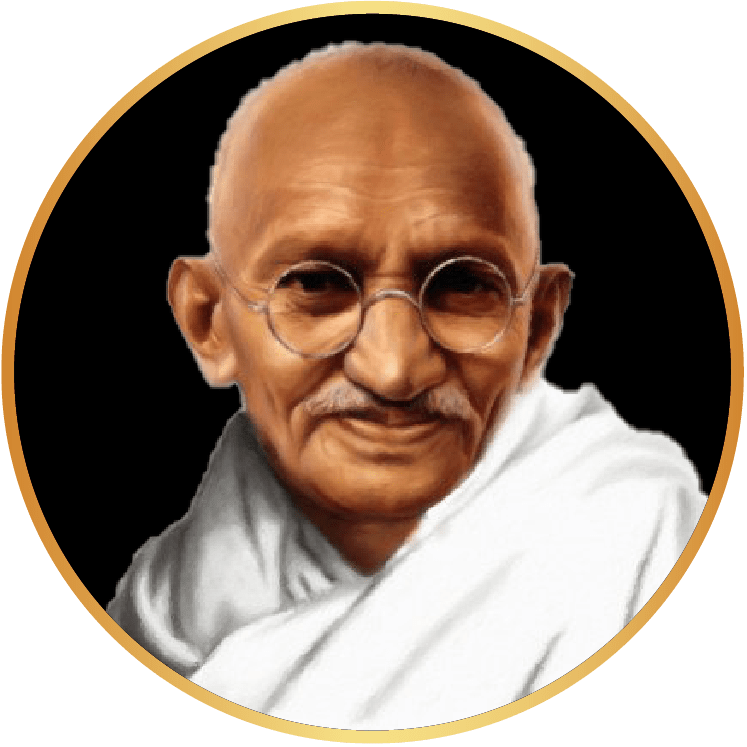
Mahatma Gandhi
Mohandas Karamchand Gandhi was an Indian lawyer, anti-colonial nationalist[5] and political ethicist. He is widely acknowledged as one of the 20th century's most influential people, who employed nonviolent resistance to lead the successful campaign for India's independence from British rule, and to later inspire movements for civil rights and freedom across the world. The honorific Mahātmā (Sanskrit: "great-souled", "venerable"), first applied to him in 1914 in South Africa, is now used throughout the world.
Born and raised in a Hindu family in coastal Gujarat, Gandhi trained in the law at the Inner Temple, London, and was called to the bar at age 22 in June 1891. After two uncertain years in India, where he was unable to start a successful law practice, he moved to South Africa in 1893 to represent an Indian merchant in a lawsuit. He went on to live in South Africa for 21 years. It was here that Gandhi raised a family and first employed nonviolent resistance in a campaign for civil rights. In 1915, aged 45, he returned to India and soon set about organising peasants, farmers, and urban labourers to protest against excessive land-tax and discrimination.
Assuming leadership of the Indian National Congress in 1921, Gandhi led nationwide campaigns for easing poverty, expanding women's rights, building religious and ethnic amity, ending untouchability, and, above all, achieving swaraj or self-rule. Gandhi adopted the short dhoti woven with hand-spun yarn as a mark of identification with India's rural poor. He began to live in a self-sufficient residential community, to eat simple food, and undertake long fasts as a means of both introspection and political protest. Bringing anti-colonial nationalism to the common Indians, Gandhi led them in challenging the British-imposed salt tax with the 400 km (250 mi) Dandi Salt March in 1930 and in calling for the British to quit India in 1942. He was imprisoned many times and for many years in both South Africa and India. Gandhi took leadership of the Congress in 1920 and began escalating demands until on 26 January 1930 the Indian National Congress declared the independence of India. The British did not recognise the declaration but negotiations ensued, with the Congress taking a role in provincial government in the late 1930s. Gandhi and the Congress withdrew their support of the Raj when the Viceroy declared war on Germany in September 1939 without consultation. Tensions escalated until Gandhi demanded immediate independence in 1942 and the British responded by imprisoning him and tens of thousands of Congress leaders. Meanwhile, the Muslim League did co-operate with Britain and moved, against Gandhi's strong opposition, to demands for a totally separate Muslim state of Pakistan. In August 1947 the British partitioned the land with India and Pakistan each achieving independence on terms that Gandhi disapproved.
Gandhi's birthday, 2 October, is commemorated in India as Gandhi Jayanti, a national holiday, and worldwide as the International Day of Nonviolence. Gandhi is commonly, though not formally, considered the Father of the Nation in India and was commonly called Bapu (Gujarati: endearment for father)
Gandhi influenced important leaders and political movements. Leaders of the civil rights movement in the United States, including Martin Luther King Jr., James Lawson, and James Bevel, drew from the writings of Gandhi in the development of their own theories about nonviolence. King said "Christ gave us the goals and Mahatma Gandhi the tactics." King sometimes referred to Gandhi as "the little brown saint." Anti-apartheid activist and former President of South Africa, Nelson Mandela, was inspired by Gandhi. Others include Steve Biko, Vaclav Havel, and Aung San Suu Kyi.
At 5:17 pm on 30 January 1948, Gandhi was with his grandnieces in the garden of Birla House (now Gandhi Smriti), on his way to address a prayer meeting, when Nathuram Godse, a Hindu nationalist, fired three bullets into his chest from a pistol at close range. According to some accounts, Gandhi died instantly. In other accounts, such as one prepared by an eyewitness journalist, Gandhi was carried into the Birla House, into a bedroom. There he died about 30 minutes later as one of Gandhi's family members read verses from Hindu scriptures.

